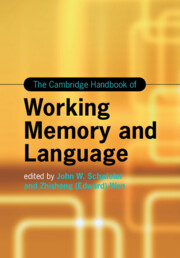Book contents
- The Cambridge Handbook of Working Memory and Language
- Cambridge Handbooks in Language and Linguistics
- The Cambridge Handbook of Working Memory and Language
- Copyright page
- Contents
- Figures
- Tables
- About the Editors
- About the Contributors
- Acknowledgments
- Overview of the Handbook
- Part I Introduction
- Part II Models and Measures
- Part III Linguistic Theories and Frameworks
- Part IV First Language Processing
- Part V Bilingual Acquisition and Processing
- Part VI Language Disorders, Interventions, and Instruction
- 33 Specific Learning Disorders as a Working Memory Deficit
- 34 A New Perspective on the Connection between Memory and Sentence Comprehension in Children with Developmental Language Disorder
- 35 Working Memory and Childhood Deafness
- 36 Working Memory Training in the Classroom
- 37 Working Memory and Classroom Learning
- 38 Cognitive Load Theory and Instructional Design for Language Learning
- 39 Working Memory Training
- Part VII Conclusion
- Index
- References
39 - Working Memory Training
Meta-Analyses and Clinical Implications
from Part VI - Language Disorders, Interventions, and Instruction
Published online by Cambridge University Press: 08 July 2022
- The Cambridge Handbook of Working Memory and Language
- Cambridge Handbooks in Language and Linguistics
- The Cambridge Handbook of Working Memory and Language
- Copyright page
- Contents
- Figures
- Tables
- About the Editors
- About the Contributors
- Acknowledgments
- Overview of the Handbook
- Part I Introduction
- Part II Models and Measures
- Part III Linguistic Theories and Frameworks
- Part IV First Language Processing
- Part V Bilingual Acquisition and Processing
- Part VI Language Disorders, Interventions, and Instruction
- 33 Specific Learning Disorders as a Working Memory Deficit
- 34 A New Perspective on the Connection between Memory and Sentence Comprehension in Children with Developmental Language Disorder
- 35 Working Memory and Childhood Deafness
- 36 Working Memory Training in the Classroom
- 37 Working Memory and Classroom Learning
- 38 Cognitive Load Theory and Instructional Design for Language Learning
- 39 Working Memory Training
- Part VII Conclusion
- Index
- References
Summary
Working memory (WM) training explores whether and how repeated practice on working memory tasks might generalize to a variety of outcome measures. Although this field of research is part of the growing literature in cognitive sciences, it has spawned contentious debates. The controversies are largely driven by inconsistent findings and commercial interests, and as a result, numerous meta-analyses and systematic reviews have focused on the validity of WM training. Similarly, there is an inconsistency in the conclusions drawn by these meta-analyses; while there seems to be an agreement about the generalization to proximal cognitive measures; there is a discrepancy in the interpretation of any translational outcomes (e.g., behavioral, clinical, and academic). In this chapter, we review the collection of meta-analyses with a particular focus on children diagnosed with ADHD and other developmental disabilities, and recommend that the field should focus on improving our understanding of the mechanistic and effectiveness properties of WM training, which might result in the development of valuable alternative and/or supplemental approaches, when traditional interventions might fall short, especially for individuals typically underrepresented and underserved.
- Type
- Chapter
- Information
- The Cambridge Handbook of Working Memory and Language , pp. 881 - 906Publisher: Cambridge University PressPrint publication year: 2022
References
- 1
- Cited by



